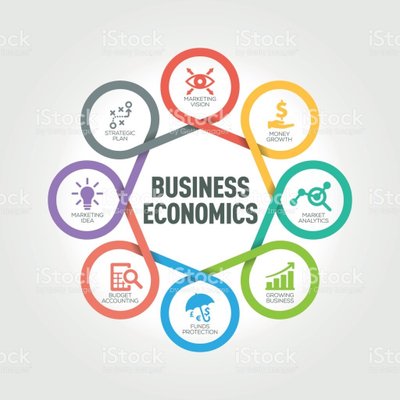Business and Economics Approaches for Long-Term Growth in a Evolving World
Business and Economics Approaches for Long-Term Growth in a Evolving World
Blog Article
Recognizing Financial Concepts for Better Company Decision-Making
In the facility landscape of modern-day business, a comprehensive understanding of financial principles can significantly improve decision-making procedures. By taking a look at aspects such as market structures and customer behavior, companies can customize their techniques to straighten with competitive dynamics and consumer requirements. Moreover, insights right into need elasticity and possibility expenses supply a structure for optimizing resource allowance. However, the application of these economic concepts commonly exposes unexpected challenges and opportunities that can redefine tactical strategies. What effects do these insights hold for the future of company strategy?
The Essentials of Economic Concept
Economic theory acts as the structure for comprehending how individuals and organizations choose in the visibility of shortage. At its core, economic theory checks out the allowance of minimal sources to satisfy endless desires. This basic principle of scarcity necessitates trade-offs, compelling decision-makers to examine the expenses and benefits connected with different options.
Both main branches of financial theory are macroeconomics and microeconomics. Microeconomics focuses on private agents, such as customers and firms, analyzing their habits and interactions in specific markets. It highlights principles like supply and need, price flexibility, and market stability, which are vital for recognizing exactly how prices are identified and exactly how resources are distributed.
Alternatively, macroeconomics examines the economic situation as an entire, dealing with wider problems such as inflation, unemployment, and economic development. It offers understandings right into systemic sensations that impact all economic agents, guiding policymakers in crafting efficient financial methods.
Eventually, a strong grounding in financial concept is vital for reliable business decision-making. By recognizing the principles of deficiency, compromises, and market characteristics, companies can much better browse intricate environments and make informed selections that enhance their affordable benefit.
Key Economic Indicators
Secret economic indicators act as vital devices for assessing the health and instructions of an economic climate, providing important understandings for business decision-making. These signs are quantitative procedures that mirror the economic performance and can be categorized into leading, lagging, and coincident signs.
Leading signs, such as customer confidence indexes and supply market fads, forecast future financial task, permitting services to anticipate adjustments out there. Delaying indications, like joblessness prices and corporate revenues, supply understandings right into the economic climate's past efficiency, aiding businesses to assess long-term fads. Coincident indicators, such as GDP growth and retail sales, rise and fall at the same time with the economy, using a real-time photo of economic problems.
Comprehending these indications makes it possible for organizations to make informed choices pertaining to financial investments, resource appropriation, and tactical preparation. By very closely keeping an eye on these crucial financial signs, businesses can browse unpredictabilities and position themselves efficiently in the ever-changing economic landscape, ultimately enhancing their decision-making procedures and long-lasting success.

Market Frameworks and Dynamics
Recognizing market structures and dynamics is critical for organizations intending to prosper in affordable environments. Market frameworks, broadly categorized right into perfect competitors, monopolistic competition, oligopoly, and monopoly, dramatically influence rates methods, product distinction, and competitive actions. Each framework presents one-of-a-kind challenges and chances that can determine a company's strategic direction.
Oligopolies, defined by a few dominant gamers, lead to synergistic decision-making; firms should thoroughly consider competitors' feedbacks to their activities. Monopolies exist when a single company regulates the market, resulting in optimal rates power however typically attracting regulatory scrutiny.
Comprehending these characteristics makes it possible for services to prepare for market fads, adjust methods, and enhance source allotment. Additionally, acknowledging how outside variables like innovation and law influence these frameworks can enhance critical preparation. By understanding market frameworks and characteristics, companies can make informed decisions, ultimately improving their affordable position and driving sustainable growth.
Consumer Actions Insights
Consumer actions plays a critical duty in shaping business methods and outcomes. Recognizing how customers make buying decisions, their preferences, and the variables affecting their behavior can substantially enhance a business's capacity to satisfy market demands. Trick insights into consumer actions can be derived from examining demographics, psychographics, and behavior patterns.
Demographic aspects such as age, education and learning, gender, and income level supply a fundamental understanding of target audience. Psychographics delve deeper, checking out customers' way of livings, perspectives, and values, which can affect brand name commitment and item assumption. Behavioral understandings, such as purchasing regularity and action to promos, are important for customizing advertising initiatives.
In addition, outside aspects like check these guys out economic problems, cultural patterns, and technical advancements also impact customer options. As an example, during economic declines, consumers might focus on crucial items see this here over deluxe items, altering demand patterns.
Using Business Economics to Method
Insights gained from consumer behavior contribute in formulating reliable organization techniques. By leveraging economic concepts, organizations can much better comprehend market characteristics, maximize resource allowance, and boost competitive placing. Examining demand flexibility, for example, allows companies to change rates methods to take full advantage of income while staying appealing to customers.
Additionally, understanding market division enables services to tailor their offerings, guaranteeing they satisfy the certain requirements and preferences of varied consumer teams. Business and Economics. This targeted method boosts customer satisfaction and promotes brand name loyalty
:max_bytes(150000):strip_icc()/business-economics.asp-FINAL-625037bc97be4d2291ea40d6d291c9f5.png)
Integrating video game theory into strategic planning likewise supplies understandings into affordable actions, allowing firms to prepare for competing actions and devise counter-strategies effectively.

Verdict
To conclude, a detailed understanding of economic principles dramatically enhances business decision-making. By analyzing market structures, examining consumer habits, and examining key economic indicators, companies can establish efficient approaches that align with market demands. The application of principles such as need flexibility and chance expenses additionally help in optimizing resource allotment and financial investment choices. Inevitably, incorporating these economic theories fosters enhanced critical options, facilitating far better anticipation of market trends and competitive actions, therefore driving success.
In the facility landscape of modern organization, a complete understanding of financial concepts can substantially improve decision-making processes.Leading signs, such as consumer self-confidence indexes and supply market patterns, predict future economic activity, enabling businesses to expect modifications in the market. By very closely monitoring these essential financial signs, companies can navigate uncertainties and place themselves properly in the ever-changing financial landscape, eventually enhancing their decision-making procedures and long-lasting success.
By leveraging economic concepts, services can better recognize market dynamics, optimize source allotment, and enhance affordable positioning.In conclusion, a comprehensive understanding of economic concepts considerably boosts service decision-making.
Report this page